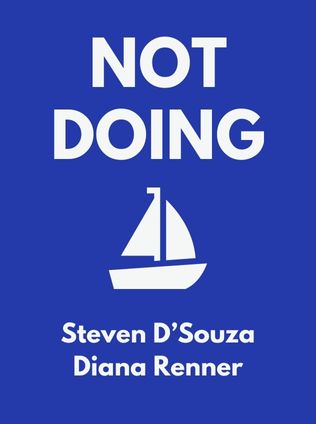
Not Doing
The Art of Turning Struggle into Ease
By Steven D’Souza, Diana Renner
Published 03/2018
About the Author
Diana Renner and Steven D’Souza, co-authors of "Not Doing: The Art of Turning Struggle into Ease," are both renowned educators and consultants specializing in leadership and management. Diana Renner, with extensive experience in leadership development, is the director and co-founder of the Uncharted Leadership Institute. Her work focuses on helping individuals and organizations navigate uncertainty and complex challenges. Steven D’Souza is an international educator with expertise in human resources, leadership, and talent management. He is also a seasoned executive coach, working frequently with senior teams, including at the CEO level. Together, they bring a wealth of knowledge and practical experience to the exploration of "Not Doing," a concept that challenges traditional notions of productivity and success.
Main Idea
"Not Doing: The Art of Turning Struggle into Ease" by Diana Renner and Steven D’Souza presents a transformative approach to life and work by advocating for a philosophy of "Not Doing." This concept emphasizes working in harmony with natural energy and the flow of life, rather than constantly pushing and striving. In a world where busyness and productivity are often equated with success, the authors propose that stepping back, observing, and allowing things to unfold can lead to greater well-being, creativity, and sustainable success. The book explores how this approach can alleviate the exhaustion and burnout associated with the relentless pursuit of achievement and offers practical strategies for embracing ease and flow in daily life.
Table of Contents
- Introduction
- The Dysfunctions of Doing
- Negative Capabilities
- Let the Mud Settle
- Let Go of the Shore
- Less Is More
- The River Knows its Destination
- Wu Wei
- Do Nothing
- Conclusion
The Dysfunctions of Doing
In the first main section, the authors delve into the "Dysfunctions of Doing," highlighting the pitfalls of our society's obsession with constant activity and productivity. They argue that this relentless focus on doing can lead to exhaustion, mistakes, and a sense of unfulfillment. The culture of busyness often overlooks the importance of thoughtful action and the benefits of pausing to reflect. Renner and D’Souza describe how the pressure to constantly achieve and produce can create a toxic environment where individuals feel overwhelmed and disconnected from their true purpose.
- Exhaustion: The constant push to achieve more leads to physical and emotional burnout, affecting overall well-being.
- Inefficiency: Ironically, overemphasis on busyness can result in decreased productivity and increased errors.
- Loss of Fulfillment: A focus on output rather than meaningful engagement can lead to a lack of satisfaction and joy in both personal and professional life.
The authors encourage readers to recognize these dysfunctions and to question the societal norms that prioritize activity over well-being. By becoming aware of these issues, individuals can begin to shift their focus from doing to being, allowing for a more balanced and fulfilling approach to life.
Sign up for FREE and get access to 1,400+ books summaries.
You May Also Like
The Subtle Art of Not Giving a F*ck
A Counterintuitive Approach to Living a Good Life
By Mark MansonRich Dad Poor Dad
What the Rich Teach Their Kids About Money - That the Poor and Middle Class Do Not!
By Robert T. KiyosakiHow To Win Friends and Influence People
The All-Time Classic Manual Of People Skills
By Dale CarnegieQuiet: The Power of Introverts
The Power of Introverts in a World That Can't Stop Talking
By Susan Cain



















